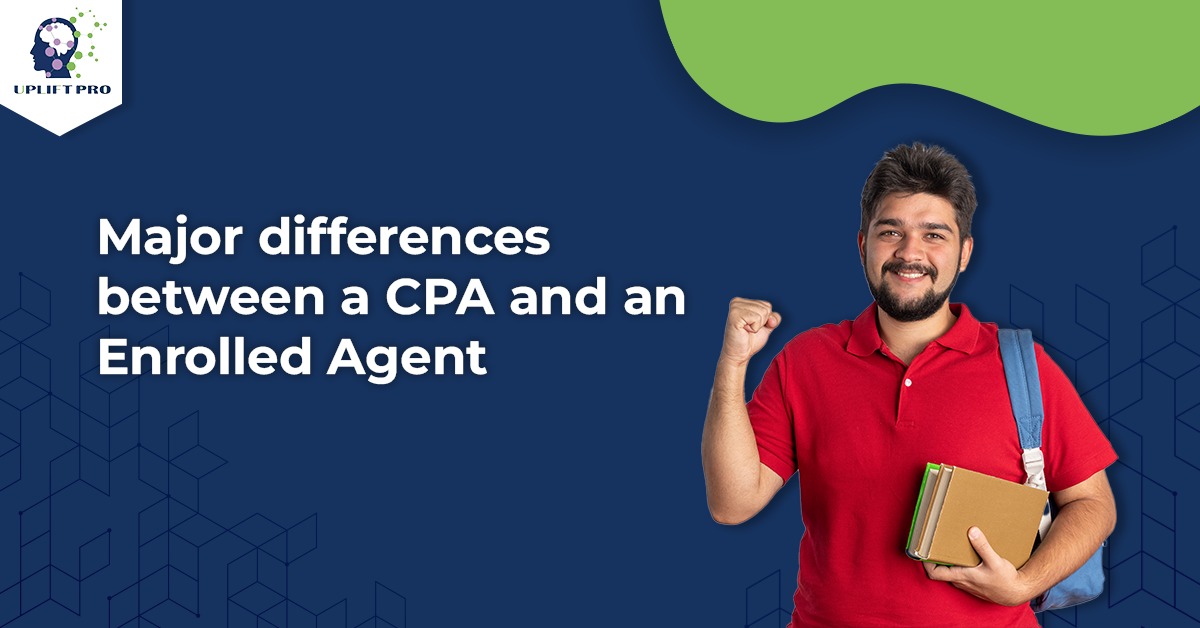The area of taxation accounting demands a skilled professional to deal with whether for an individual or a business. When we consider such professionals, two coveted international credentials often come to our mind- a Certified Public Accountant or an Enrolled Agent (EA). Obviously, we will want to know which of them will serve the purpose and what are areas they are specialized for rather than the differences between the two irrespective of either engaging them or choosing either or both for career development. Let us discuss the differences between a CPA and an EA here.
It is to be noted that both Enrolled Agents (EA) and Certified Public Accountants (CPA) are licensed professionals who can effectively handle the tax issues of an individual or a business. The primary difference between the two lies in the fact that the license of an EA is authorized by the federal government, i.e., the Internal Revenue Service (IRS) while the CPA license is issued by any of the 55 U.S. states.
This means a CPA has restricted authority to the state level whereas an EA can work across the country. A CPA license is a two-way process where one must clear the CPA exam conducted by AICPA first and then apply for the license separately. On the contrary, an EA license is a single-step process by which one can get an EA license by clearing the exam only.
For a job aspirant, it often creates a dilemma of which path to take in the domain of accountancy. The roles of EAs are centered around a specific niche i.e., taxation but holding greater authority since they represent their clients before the IRS. On the other hand, CPAs’ range of services are much wider rather than taxation and expanded to public accountants, tax accountants, personal finance managers, business consultants, auditors, etc.
What is a CPA?
A licensed CPA is used to carry the following roles :
- Accountants
- Financial Advisor
- Tax specialists
- Financial Planner
- Individual and Business Consultants
- Chief Financial Officer
- Auditor
- Controller
It means apart from preparing and filing tax returns, a CPA can do auditing and is able to give wealth-related financial advice. For earning a CPA credential, one must clear the four parts of the CPA exam administered by AIPCA where 18 months’ time will be given to pass the sections in an exam cycle. CPAs are governed by the individual US states each of which has different eligibility criteria regarding age, experience, educational qualifications, etc.
What is an Enrolled Agent (EA)?
- An enrolled agent (EA) is an IRS-authorized tax professional. EA is considered highly coveted as it is the highest credential awarded by the IRS.
- EAs are especially skilled in taxation in its most complicated form. They can represent their client before the IRS regarding tax disputes/discrepancies, appeals, etc.
- Being a federal license holder, EAs can represent any taxpayers from any part of the country to any IRS office without restriction. To earn an EA license, one must pass the three parts of the Special Enrollment Examination (SEE) exam. After clearing one part, the candidate can take the other parts at convenience. The score stays valid for two years. Former IRS employees with the required skill and expertise can get the EA license directly without any exam.
- Ethical commitment is a must for an EA. To maintain the standard, completion of 72 hours of continuing education courses is mandatory after each 3 years for a licensed EA.
Briefly:
CPA Vs.EA-Licensing
CPA: Professional bodies of different US states give the license.
EA: Federal Government, IRS.
CPA Vs.EA-Examination:
CPA: One must clear a 4-part CPA exam.
EA: One must clear the 3-part SEE exam.
CPA Vs.EA-Exam Sections:
CPA:
- Auditing and Attestation (AUD)
- Business Environment and Concepts (BEC)
- Financial Accounting and Reporting (FAR)
- Regulation (REG).
EA:
- Individual
- Business
- Representation, Practices, and Procedures.
CPA Vs.EA-Exam Features:
CPA: Passing of all 4 parts is required within 18 months. A minimum of 75 marks is required to pass each part of the exam.
EA: The score of each test section is valid for 2 years which has been extended to 3 years due to covid. The passing score for each section is scaled to 105.
CPA Vs.EA-Cost:
CPA: 180-250$ per exam.
EA: 203$ per exam part.
CPA Vs.EA-Expected Salary:
CPA: Around 66000$ a year with 1 yr experience.
EA: 40000-65000$ per annum as per experiences.
Which Path to take?
If you have the inclination, determination, and the required academic and professional qualifications with the intent to become a seasoned auditor in public accounting along with the tax matter, go for the CPA but keep in mind it is costlier.
On the other hand, if you want to work as a tax professional in a specific domain EA should be your cup of choice. Mind it, to be an EA, there is no set academic qualification. The exam is quite easier than CPA and is economical and affordable too.
However, since the REG part of CPA is covered in EA, one can also go for a dual qualification simultaneously by availing some offers like what Uplift Pro is providing where a free EA course is offered with official CPA admission.
For Further Information/Assistance, Contact:
